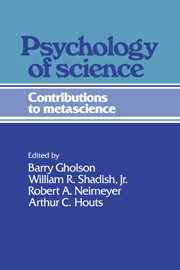Book contents
- Frontmatter
- Contents
- Preface
- Contributors
- 1 The psychology of science: An introduction
- Part I Historical issues in the psychology of science
- Part II The case for a psychology of science
- Part III Creativity and the psychology of science
- 7 Chance-configuration theory of scientific creativity
- 8 A perspectivist approach to the strategic planning of programmatic scientific research
- 9 Networks of enterprise in creative scientific work
- Part IV Cognition in the psychology of science
- Part V Social factors in the psychology of science
- Part VI Epilogue and Prologue
- Author index
- Subject index
9 - Networks of enterprise in creative scientific work
Published online by Cambridge University Press: 05 June 2012
- Frontmatter
- Contents
- Preface
- Contributors
- 1 The psychology of science: An introduction
- Part I Historical issues in the psychology of science
- Part II The case for a psychology of science
- Part III Creativity and the psychology of science
- 7 Chance-configuration theory of scientific creativity
- 8 A perspectivist approach to the strategic planning of programmatic scientific research
- 9 Networks of enterprise in creative scientific work
- Part IV Cognition in the psychology of science
- Part V Social factors in the psychology of science
- Part VI Epilogue and Prologue
- Author index
- Subject index
Summary
In many discussions of creativity, so much emphasis is put on such features as spontaneity, intuition, and unconscious processes that one loses sight of the fact that, for the most part, creative work is purposeful. Even the less rational features of the entire process take place within a context regulated by the creative person's purposes. In the evolving systems approach to creative work (Gruber, 1980; Gruber & Davis, 1987; Wallace, 1985; Wallace & Gruber, in press), we have considered the creative person as a system composed of three main subsystems: an organization of knowledge, an organization of purpose, and an organization of affect. Each of these subsystems is constantly evolving, and is doing so in a sort of internal milieu provided by the others.
One important feature of the evolving systems approach is the embodiment of the organization of purpose in networks of enterprise. I use the term “enterprise” to cover groups of activities extended in time and embracing other activities such as projects, problems, and tasks. Commitment to an enterprise is exhibited by the recurrent reappearance of activities belonging to it. The key point is that the creative completion of a project leads not only to satisfaction and relaxation but also to the replenishment of the stock of projects and problems within the enterprise in question, and to reinvigoration for further work.
The concept of enterprise helps us to understand the organization of a creative person's activity.
- Type
- Chapter
- Information
- Psychology of ScienceContributions to Metascience, pp. 246 - 266Publisher: Cambridge University PressPrint publication year: 1989
- 19
- Cited by

